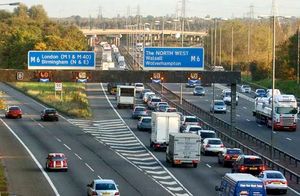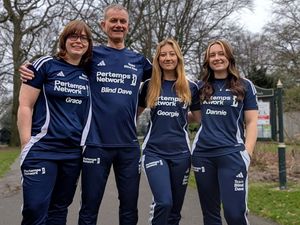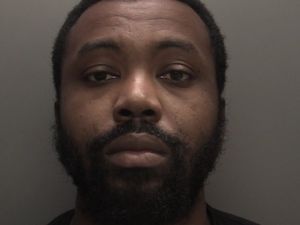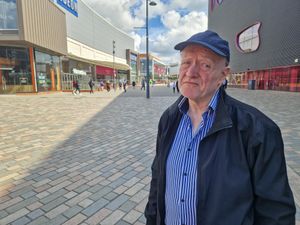Man absconded from mental health facility before being found dead on motorway
A man found dead on the M5 had been receiving treatment at a mental health facility in West Bromwich when he disappeared after going into its garden for a cigarette, an inquest has heard.

Leonard Lowe died of multiple injuries on the northbound carriageway of the motorway, near the Newton Road bridge, at around 7am on February 7 last year.
The 59-year-old, who was known as Terry, was being treated for mental health problems at Hallam Street Hospital, when he left the facility around half an hour earlier.
The jury at Back Country Coroners Court heard that at around 6.20am Mr Lowe had approached staff and asked if he could go to McDonalds for breakfast but was persuaded to stay for an assessment.
Kerdall Manning, a healthcare worker on the hospital’s Abbey Ward, said: “I saw Leonard Lowe in the corridor - he presented as calm and quiet.
“He did not have access to a (cigarette) lighter.
“I got one and unlocked the door so he could go out in the garden to smoke.
“I did not see Mr Lowe in the garden, I realised he was missing at 7am.
“I informed other staff I could not find him - we searched the whole building.
“I have no idea how he absconded - it is possible he climbed over the garden fence or got out through the front door.”
The inquest heard that Mr Lowe, of Park Hill, Wednesbury, met with Samina Allie, a counselling psychologist from Black Country Healthcare, the previous month and agreed to engage in assessment.
Mr Lowe described having interpersonal difficulties and “said inappropriate things to others”.
He had also been diagnosed with autism.
Ms Allie learned that earlier in his life Mr Lowe had been physically abused by his mother and bullied at school until the age of 16.
After 40 years of employment Mr Lowe had been dismissed from work, had lost his temper with his wife and smashed windows.
He had also been imprisoned for assault.
“He said being on the ward reminded him of being in prison,” said Ms Allie.
“He kept to himself, isolated in his bedroom - he was worried about hurting someone.”
The psychologist added that Mr Lowe “was able to set goals around improving communications with his wife”.
At a review on January 27, she said Mr Lowe "was worried he may become frustrated at home” but recommended Mr Lowe have one or two sessions there.
The inquest heard that on February 3 Mr Lowe made a threat to kill his wife or himself if he went home.
A nurse at the hospital who worked the night shift prior to Mr Lowe’s death, Tamhi Chioreka, said she asked for safeguarding to be implemented applicable to both Mr Lowe and his wife.
“We have to do it straight away,” she said.
“Is there a form to fill out?” asked Mr Richard Wheeler, representing Mr Lowe’s family.
“Yes, there is an incident report,” she replied.
“What happens to the form?”
“It goes to the safeguarding team at the trust.”
Nurse Chioreka said she asked if the safeguarding had been done but could not remember who said they had done it.
She also told the court that she was aware that Mr Lowe had previously hit himself with his walking stick.
“Terry approached you at 1am (on February 7) and asked you to take his stick, is that right?” asked Mr Wheeler.
“Yes,” replied Nurse Chioreka.
“He was pacing around - he was anxious.”
Nurse Chioreka said he was given 25 milligrams of sedative but it did not cause him to fall asleep.
“He slept for one hour the whole night,” she said.
The inquest heard that there are different levels of observation for patients at the hospital.
Level One sees them observed hourly, on the hour, while Level Two sees them observed every 15 minutes, at a quarter past, half past, a quarter to and on the hour.
Mr Lowe’s observation level was reduced on January 28 from two to one. Records show that this was not actioned until January 31.
Mrs Emma Perry, divisional director of nursing at Black Country Healthcare, said the trust launched an investigation after Mr Lowe’s death.
She acknowledged that there was “a number of record keeping inconsistencies” and that as a result, at Abbey Ward in particular, the trust looked at developing an action plan to improve care.
Mrs Perry said Hallam Street Hospital is not a psychiatric intensive care unit, that there are patients who choose to go there and those who are detained for treatment but it is “absolutely not” a prison.
“We have not been able to identify anyone who saw Terry leave the hospital site,” said Mrs Perry.
“Staff looked for Terry when they discovered he was not present for the 7am observation round.
“He was not found on any part of Abbey Ward or the hospital.
“A member of staff went to McDonalds - he was not seen there.
“They went there because that is where he had asked to go a short time before.”
“It is an assumption Terry left via the garden” said Coroner Joanne Lees.
“That is correct,” replied Mrs Perry.
Regarding the safeguarding notice for Mr Lowe after the threats he made to kill his wife or himself, Mrs Perry confirmed that no record had been found.
She said that on February 5 the issue was also raised with Mr Lowe’s psychologist who referred it to the safeguarding team who advised further action.
Mrs Perry said the local authority’s response, the outcome of the referral, was “no further action”.
“What I was not able to get was the rationale for the ‘no further action’ decision,” she added.
The inquest continues.





